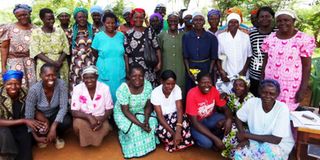Widowhood a source of distress in Luo Nyanza

A group of women from Nyanza who have been vocal against wife (widow) inheritance. Claims that the rite is mandatory among the Luo is opportunistic nonsense on stilts.
What you need to know:
- Many widows' troubles revolve around them being evicted from the matrimonial homes by brothers-in-law (sometimes aided by mothers-in-law) for allegedly refusing to be re-married through Levirate unions.
- The claims by perpetrators that widow inheritance is mandatory among the Luo and that non-compliance brings ill omen to the family are both opportunistic nonsense on stilts.
Many times when we hear of traditional councils of elders, it is in regard to some political shenanigans or competition for office. It is, therefore, gratifying that some councils are doing progressive work in protecting women’s rights, as documented in The Compendium of Cases by the Luo Council of Elders by the human rights NGO Kelin, based on cases resolved in Kisumu and Homa Bay counties.
The cases mainly revolve around widows evicted from the matrimonial homes by brothers-in-law (sometimes aided by mothers-in-law) for allegedly refusing to be re-married through Levirate unions.
The typical victim is a HIV-positive widow married under customary law. She is of low socio-economic status, ignorant of her rights and fully dependent on the husband. The widows cite their HIV status as the reason for reluctance to re-marry. But this is turned around by the relatives to brutalise them for ‘killing their sons’.
The claims by perpetrators that widow inheritance is mandatory among the Luo and that non-compliance brings ill omen to the family are both opportunistic nonsense on stilts.
That the typical man in the community dismisses sero-positivity as the widows’ reason for reluctance to be conjugated to brothers-in-law means that the idea of HIV as a life-threatening disease never sank, and probably never will!
First born son
In some cases, the widows are dammed if they do and damned if they don’t. For example, a widow who accepted to be inherited by her brother-in-law was evicted by her own, obviously impudent, first-born son claiming he was the automatic heir of the father.
One encouraging case is that of a woman who lived away with the husband from the ancestral home. After his death and burial, the land was alienated by the brother-in-law.
Luckily, she had the original title deed to the land, which she used to reclaim it with the help of the elders. This demonstrates the importance of women having such documents in their custody.
Most of the women assisted were referred by former beneficiaries of Kelin as well as women’s and orphans’ groups. This attests to the importance of such social units as entry points for reaching women in distress. The elders deployed to handle the cases, both men and women, were first trained on the relevant laws and rights hence operated from a point of knowledge.
The digest demonstrates that alternative dispute resolution mechanisms can be used effectively to protect and advance women’s rights, as provided for in Article 159(2) (c) of the Constitution of Kenya.
Different perspectives
However, the cases presented give just the bare facts denuded of the detail a practitioner would need to analyse the nuances from different perspectives. Moreover, the text does not highlight challenges faced in resolving the issues.
For example, it does not show whether there was any resistance by chauvinists to inclusion of women among the elders handling the cases and if so, how it was dealt with.
Lack of such information makes the compendium sound like an exercise in self-praise and renders it difficult to isolate gender dynamics to be addressed in strengthening and making the council of elders more gender-responsive.
In addition, one wonders whether Kelin handled any cases beyond the right to property and domicile. These include under-age marriage, domestic violence, forced marriage and denying married daughters the right to inherit family land as well as if there were any cases where men were the aggrieved parties!
Source of distress
These cases demonstrate that there is little protection for widows in parts of Luoland and that widowhood is a serious source of distress. This is an embarrassing blot on a community which has an exaggerated self-perception as a civilized and enlightened society.
The cases point to a number of issues that need to be addressed in women’s empowerment. These include formal registration of marriages for ocular proof of entitlement to matrimonial property, formal education, economic self-reliance and access to a network of supportive women and civil society actors.
Beyond the specific community, that these primitive things are still happening in Kenya more than 50 years after independence is an ugly testament to our poor proactivity in making citizens aware of their rights. One wonders what the government is doing to ensure that all marriages are registered. .
Why is registration of marriages still centralised in Nairobi and regional headquarters instead of being decentralised to wards to make them accessible to citizens? y
Why can’t the government make assistant chiefs marriage registrars for all customary unions? Why develop progressive laws such as the Marriage Act 2014 and Matrimonial Property Act 2014 and then frustrate them through negligence?
Dr Okumba Miruka is an international gender and development consultant and scholar ([email protected]).





